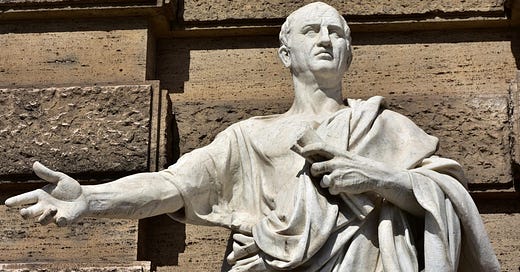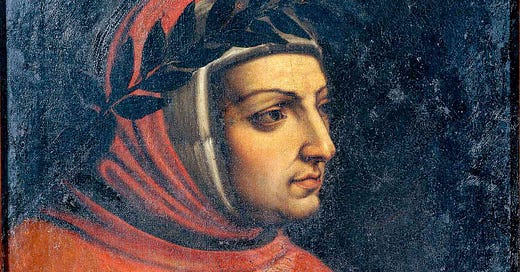In the shark tank of Republican Rome, the unicorn who could wield both quill and political clout with equal virtuosity was vanishingly rare.
This scarcity is precisely what makes Cicero's intellectual footprint so indelible.
While other senator-scholars like Gaius Cassius Parmensis and Gaius Sempronius Tuditanus (both figures on our cultural imagination outer margin, so you’ll be forgiven for ignoring their names) attempted to thread this same needle, their works survive only as intellectual shrapnel – tantalizing fragments that leave Cicero standing as our most complete specimen of this fascinating hybrid.
The Roman elite conceptualized life as a high-wire act between two essential states: negotium– the relentless hustle of public affairs, political maneuvering, and civic obligation, the source of ‘negotiation’ – and otium – the contemplative downtime that enabled scholarly deep dives - the noble ancestor of our vulgar adjective ‘otiose’.
This wasn't mere relaxation but "productive leisure" (otium negotiosum), a space for intellectual flex considered non-negotiable (pun intended) for any Roman with serious cultural capital.
The concept of otium post negotium – rest after the grind – embodied the work-life integration a mature person should cultivate.
For Cicero, these realms existed in perpetual tug-of-war. Though he considered his political résumé "his most important achievement," history remembers him equally for dropping philosophical heat. During his political prime (peaking with his consulship of 63 BC), his writing took a backseat. It was during periods of career timeout – particularly after Caesar's rise to power – that his philosophical output flourished.
The political backdrop for these writings isn't just context, but rather essential.
As the Republic imploded around him, Cicero ghosted the public sphere, retreating to his study to produce intellectual masterpieces like De Republica and De Legibus. These weren't ivory tower thought experiments but guerrilla warfare by other means – passionate defenses of Republican values against authoritarian creep.
Through philosophy, Cicero fought battles he could no longer wage in the Senate's arena.
What made Cicero exceptional wasn't just dual-domain mastery but his seamless integration of both worlds.
His philosophical works hacked Greek wisdom for Roman consumption while engineering an entirely new Latin philosophical lexicon.
Meanwhile, his political oratory showcased how abstract principles could power practical governance.
The Roman who could juggle the dagger of political intrigue with the stylus of philosophical inquiry was rare.
Cicero's enduring clout – inspiring everything from Renaissance thought to Enlightenment revolutions and beyond – stems from this unique synthesis, proving that sometimes the most disruptive legacy comes from those who dominate both the forum and the study.













